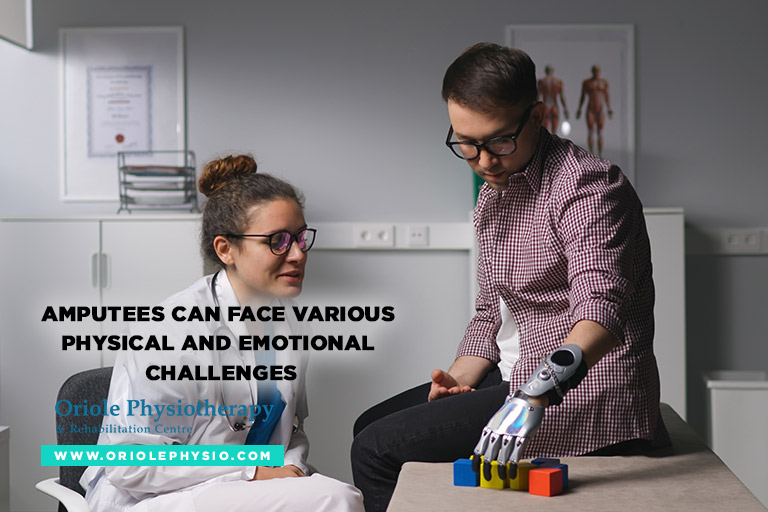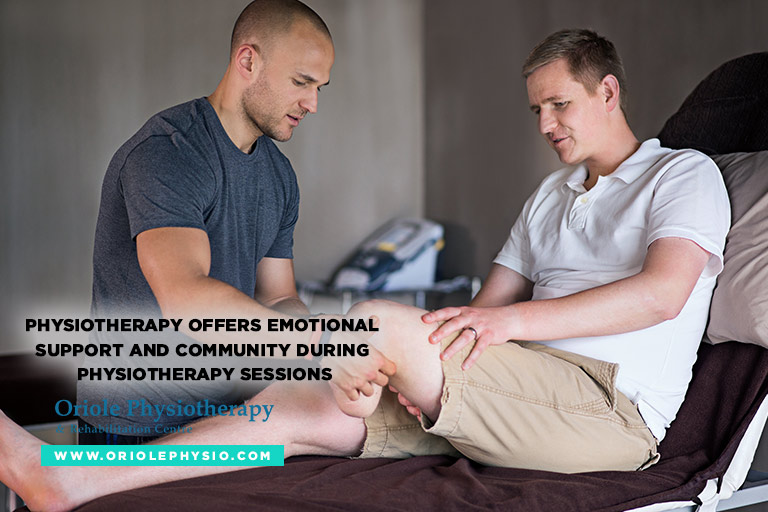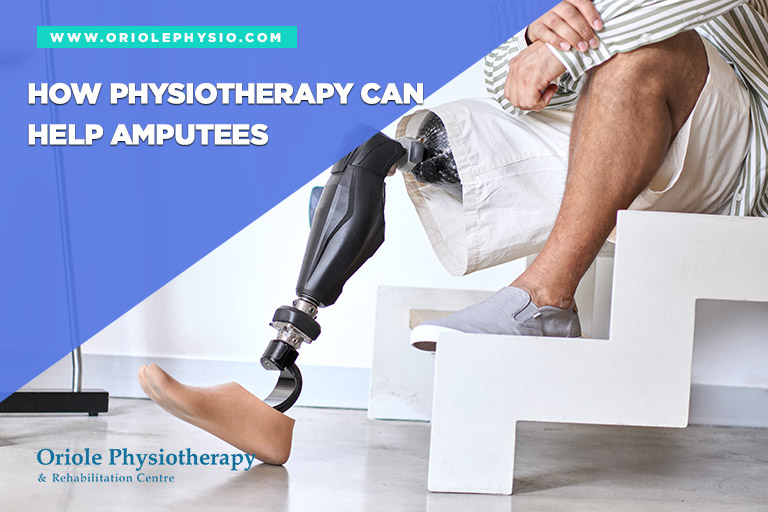How Physiotherapy Can Help Amputees
Physiotherapy is a critical component in the journey of recovery and adaptation for individuals who have undergone amputation. This article delves into the challenges amputees face and the significant role physiotherapy plays in their rehabilitation.
How Amputation Affects Amputees

Amputation, the removal of a limb or a part of a limb, can be a life-altering event. The impact of this change extends beyond the physical loss, affecting various aspects of an individual’s life:
- Physical Challenges
Amputation presents significant physical challenges for individuals. The loss of a limb fundamentally alters body mechanics, impacting mobility and balance. Adapting to these changes often requires relearning basic movements like walking, which can be particularly challenging for lower-limb amputees. Upper-limb amputees may struggle with daily tasks such as dressing or eating. The remaining limbs and muscles may experience increased strain as they compensate for the lost limb, potentially leading to overuse injuries or joint pain.
Maintaining a healthy weight becomes crucial, as weight fluctuations can affect prosthetic fit and overall mobility.
- Phantom Limb Sensations
Phantom limb sensations are a common, yet often perplexing, experience for amputees. Despite the absence of the limb, individuals may feel pain, itching, or other sensations where the limb used to be. These sensations can range from mild to severe and are believed to arise from the brain and spinal cord attempting to interpret signals from nerves that were severed during amputation. Phantom limb pain, a specific type of sensation, can be particularly distressing, manifesting as burning, cramping, or shooting pain.
- Emotional and Psychological Impact
The emotional and psychological impact of amputation can be profound. The sudden change in body image and physical capabilities can trigger a grieving process, akin to mourning a loss. Many amputees go through stages of denial, anger, and depression as they come to terms with their new reality. This emotional turmoil can affect self-esteem and lead to feelings of isolation. The psychological strain may also manifest in the form of anxiety, depression, or even post-traumatic stress disorder (PTSD), especially if the amputation was due to a traumatic event.
- Social and Occupational Adjustments
Amputees often face the challenge of adjusting to new social and occupational realities. Socially, they may encounter barriers to participating in activities they once enjoyed, leading to feelings of isolation or exclusion. The visible nature of an amputation can also attract unwanted attention or curiosity, adding to the discomfort.
Occupation-wise, amputees may need to reconsider their job roles, especially if their work is physically demanding. This may involve retraining for a different career, adapting to the current workplace, or finding new employment that accommodates their abilities. Such adjustments require not only physical adaptation but also emotional resilience.
- Secondary Health Issues
Secondary health issues are a significant concern for amputees. The change in physical activity and body mechanics can lead to a range of complications. Skin problems, such as irritation or sores, may develop at the site of the prosthesis. There’s also an increased risk of developing musculoskeletal issues like back pain or joint problems due to altered body mechanics.
Amputees, particularly those with lower limb loss, may experience decreased cardiovascular fitness and increased risk of heart disease due to reduced mobility. Weight gain is another common issue, as physical limitations can lead to a more sedentary lifestyle.
How Physiotherapy Can Help With Problems Post-Amputation

Physiotherapy is essential in addressing the problems faced by amputees and facilitating a return to an active and fulfilling life:
- Improving Mobility and Strength
Physiotherapy plays a pivotal role in enhancing mobility and strength post-amputation. The loss of a limb significantly affects balance and coordination, making it crucial for amputees to develop strength in the remaining muscles.
Through targeted exercises, physiotherapists help patients build muscle strength, improve flexibility, and increase endurance. This training is not just about compensating for the lost limb but also about preventing over-dependence on the remaining limb, which can lead to overuse injuries. Exercises are often tailored to individual needs, focusing on core stability, balance, and the strengthening of both the residual limb and the opposite limb
- Prosthetic Training
Prosthetic training involves learning how to effectively use the prosthetic limb in various situations. Physiotherapists guide patients through exercises that help them adapt to their prosthetics, teaching them how to walk, balance, and navigate different terrains. This training also includes care for the residual limb, ensuring a proper fit of the prosthetic to prevent skin issues or discomfort. The goal of prosthetic training is to enable amputees to perform daily tasks independently and safely, enhancing their quality of life.
- Pain Management
Amputees often experience various types of pain, including residual limb pain and phantom limb pain. Physiotherapy offers several strategies for pain relief, such as stretching exercises, massage, and strengthening exercises for the residual limb.
Additionally, techniques like electrical nerve stimulation and ultrasound therapy can alleviate pain. Education on pain management and coping strategies also helps patients understand and manage their pain more effectively. In some cases, a multidisciplinary approach involving other healthcare professionals may be necessary for optimal pain management.
- Emotional and Psychological Support
Physiotherapists offer a supportive environment where patients can express their concerns and frustrations. Physiotherapists often work closely with patients, building a relationship of trust and understanding, which can be incredibly beneficial for emotional well-being. They also play a role in motivating and encouraging patients, helping them set realistic goals and celebrate progress. While physiotherapists are not mental health professionals, they can recognize signs of emotional distress and refer patients to appropriate psychological support services.
- Preventing Secondary Complications
Complications can include joint deformities, muscle contractures, and poor cardiovascular health due to decreased physical activity. Physiotherapists employ various techniques to prevent these issues, such as stretching exercises to maintain joint mobility and prevent muscle tightness. They also provide guidance on proper positioning and movement techniques to avoid undue stress on other parts of the body.
Regular monitoring and adjusting of prosthetic fit are essential to prevent skin problems and discomfort. Additionally, physiotherapists advise on cardiovascular exercises to maintain heart health and overall fitness.
- Lifestyle Advice
Lifestyle advice forms an integral part of the rehabilitation process for amputees. Physiotherapists provide guidance on various aspects of daily living, tailored to the individual’s needs and capabilities. This advice can include nutritional counselling to maintain a healthy weight, which is crucial for managing the additional strain on the body and for the proper functioning of prosthetics. Physical activity recommendations are also provided, emphasizing the importance of regular exercise to improve cardiovascular health, strength, and flexibility.
Physiotherapists may also offer tips on modifying home and work environments to improve accessibility and safety. Sleep hygiene and stress management techniques are other vital areas covered, as they significantly impact overall health and well-being.
Trust a Physiotherapist to Help You Cope With Life After an Amputation
The role of physiotherapy in the lives of amputees is multifaceted, addressing both physical and emotional challenges. For those in North York seeking professional physiotherapy services, Oriole Physiotherapy & Rehabilitation Centre offers trusted care.
With a focus on personalized treatment plans, they provide services that cater to a wide range of needs, including a foot clinic in North York. To learn more about their services or to schedule an appointment, visit a physiotherapy clinic in North York or call +1 (416) 221 0772.

